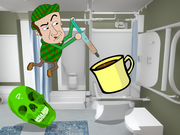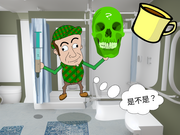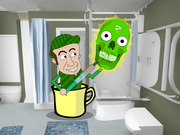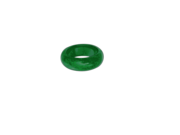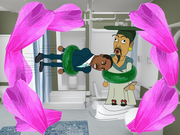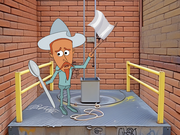to be (followed by substantives only) / correct; right; true / (respectful acknowledgement of a command) very well / (adverb for emphatic assertion)
是
=
旦
+
龰
:
Mnemonic symbol: a skull, from "to be or not to be".
Sherlock Holmes (sh) starts his day in the space station's bathroom (Ø4) with a mug of coffee (旦). Holding a skull (mnemonic symbol for 是) in his hands, he asks himself "to be, or not to be" (是). He wonders if he can make the skull come back to life using lots of coffee, and injects coffee from his mug into the skull using a syringe (龰).
Sherlock Holmes (sh) starts his day in the space station's bathroom (Ø4) with a mug of coffee (旦). Holding a skull (mnemonic symbol for 是) in his hands, he asks himself "to be, or not to be" (是). He wonders if he can make the skull come back to life using lots of coffee, and injects coffee from his mug into the skull using a syringe (龰).
是
=
日
+
下
+
人
:
Mnemonic symbol: a skull, from "to be or not to be".
Sherlock Holmes (sh) watches the Neanderthal Man (人) trying to climb to the sun (日) on a ladder (下) in the space station's bathroom (Ø4). Sherlock is afraid that he'll open the window, so he puts on a big skull (是) and scares him off.
Sherlock Holmes (sh) watches the Neanderthal Man (人) trying to climb to the sun (日) on a ladder (下) in the space station's bathroom (Ø4). Sherlock is afraid that he'll open the window, so he puts on a big skull (是) and scares him off.
jade
玉
=
丶
+
王
:
Mnemonic symbol: a jade bracelet.
Yu the Great (yu) and Martin Luther King (王) invented some kind of wrestling sport in the space station's bathroom (Ø4). Both fighters have to be restrained by large jade bracelets (玉) around their body restricting their arms to be aligned to the body. Then they fight. To make things safe they stuffed the space station's bathroom (Ø4) with cosy petals (丶) so that they won't hurt themselves.
Yu the Great (yu) and Martin Luther King (王) invented some kind of wrestling sport in the space station's bathroom (Ø4). Both fighters have to be restrained by large jade bracelets (玉) around their body restricting their arms to be aligned to the body. Then they fight. To make things safe they stuffed the space station's bathroom (Ø4) with cosy petals (丶) so that they won't hurt themselves.
emperor
帝
=
立
+
冖
+
巾
:
Mnemonic symbol: the great emperor Caesar.
Caesar prepared to sauna in the space station's bathroom, and he has his towel already around his neck when he prepares a new aufguss. Just as he wants to lift the vase, the cooking top on top of it lifts itself as Dorothy Gale looks out, laughing at Caesar.
Caesar prepared to sauna in the space station's bathroom, and he has his towel already around his neck when he prepares a new aufguss. Just as he wants to lift the vase, the cooking top on top of it lifts itself as Dorothy Gale looks out, laughing at Caesar.
of; ~'s (possessive particle) / (used after an attribute) / (used to form a nominal expression) / (used at the end of a declarative sentence for emphasis) / also pr. [di4] or [di5] in poetry and songs
surname Qin
钦
=
欠
+
钅
:
The Queen of Hearts (qi) supported the emperor in his last war. In front of the encampment ((e)n1) she receives a package by the emperor himself (钦). It contains a golden harpoon (钅) as a present and sign of his admiration (钦) for her fighting skills. He also sent an IOU note (欠) to show that in return he will help the Queen of Hearts should she be in trouble.
to respect / to admire / to venerate / by the emperor himself
钦
=
欠
+
钅
:
The Queen of Hearts (qi) supported the emperor in his last war. In front of the encampment ((e)n1) she receives a package by the emperor himself (钦). It contains a golden harpoon (钅) as a present and sign of his admiration (钦) for her fighting skills. He also sent an IOU note (欠) to show that in return he will help the Queen of Hearts should she be in trouble.
difference; discrepancy / (math.) difference (amount remaining after a subtraction) / (literary) a little; somewhat; slightly
different / wrong; mistaken / to fall short; to lack / not up to standard; inferior / Taiwan pr. [cha1]
to send (on an errand) / (archaic) person sent on such an errand / job; official post

